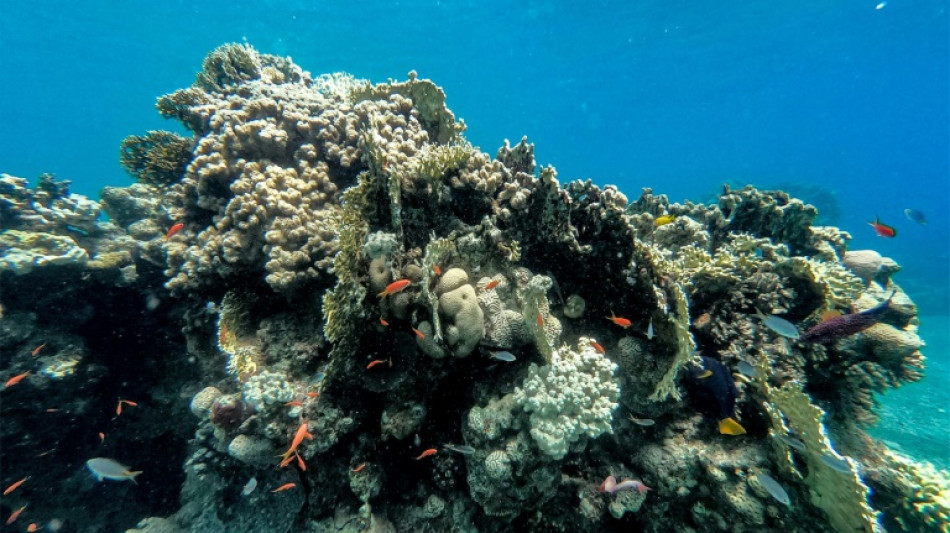
-
 Ice dancers Chock and Bates shine as US lead Japan in team event
Ice dancers Chock and Bates shine as US lead Japan in team event
-
Stellantis takes massive hit on 'overestimation' of EV demand

-
 Stocks rebound though tech stocks still suffer
Stocks rebound though tech stocks still suffer
-
Spanish PM urges caution as fresh rain heads for flood zone
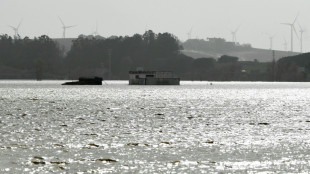
-
 Iran says to hold more talks with US despite Trump military threats
Iran says to hold more talks with US despite Trump military threats
-
Russia accuses Kyiv of gun attack on army general in Moscow

-
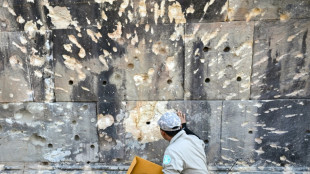 Cambodia reveals damage to UNESCO-listed temple after Thailand clashes
Cambodia reveals damage to UNESCO-listed temple after Thailand clashes
-
Norway crown princess 'deeply regrets' Epstein friendship

-
 Italy set for Winter Olympics opening ceremony as Vonn passes test
Italy set for Winter Olympics opening ceremony as Vonn passes test
-
England's Jacks says players back under-fire skipper Brook '100 percent'

-
 Carrick relishing Frank reunion as Man Utd host Spurs
Carrick relishing Frank reunion as Man Utd host Spurs
-
Farrell keeps the faith in Irish still being at rugby's top table

-
 Meloni, Vance hail 'shared values' amid pre-Olympic protests
Meloni, Vance hail 'shared values' amid pre-Olympic protests
-
Olympic freestyle champion Gremaud says passion for skiing carried her through dark times

-
 US urges new three-way nuclear deal with Russia and China
US urges new three-way nuclear deal with Russia and China
-
Indonesia landslide death toll rises to 74
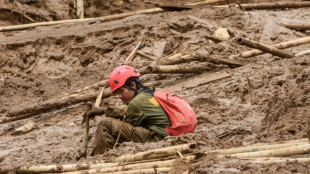
-
 Hemetsberger a 'happy psychopath' after final downhill training
Hemetsberger a 'happy psychopath' after final downhill training
-
Suicide blast at Islamabad mosque kills at least 31, wounds over 130

-
 Elton John accuses UK tabloids publisher of 'abhorrent' privacy breaches
Elton John accuses UK tabloids publisher of 'abhorrent' privacy breaches
-
Lindsey Vonn completes first downhill training run at Winter Olympics

-
 Digital euro delay could leave Europe vulnerable, ECB warns
Digital euro delay could leave Europe vulnerable, ECB warns
-
Feyi-Waboso out of England's Six Nations opener against Wales

-
 Newcastle manager Howe pleads for Woltemade patience
Newcastle manager Howe pleads for Woltemade patience
-
German exports to US plunge as tariffs exact heavy cost

-
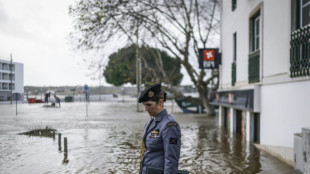 Portugal heads for presidential vote, fretting over storms and far-right
Portugal heads for presidential vote, fretting over storms and far-right
-
Suicide blast at Islamabad mosque kills at least 30, wounds over 130: police

-
 Russia says Kyiv behind Moscow shooting of army general
Russia says Kyiv behind Moscow shooting of army general
-
Greenland villagers focus on 'normal life' amid stress of US threat

-
 Iran, US hold talks in Oman after Trump military threats
Iran, US hold talks in Oman after Trump military threats
-
Stocks waver as tech worries build

-
 Dupont, Jalibert click to give France extra spark in Six Nations bid
Dupont, Jalibert click to give France extra spark in Six Nations bid
-
'Excited' Scots out to prove they deserve T20 World Cup call-up

-
 EU tells TikTok to change 'addictive' design
EU tells TikTok to change 'addictive' design
-
India captain admits 'there will be nerves' at home T20 World Cup

-
 Stellantis takes massive hit for 'overestimation' of EV shift
Stellantis takes massive hit for 'overestimation' of EV shift
-
'Mona's Eyes': how an obscure French art historian swept the globe

-
 Iran, US hold talks in Oman
Iran, US hold talks in Oman
-
Iran, US hold talks in Oman after deadly protest crackdown

-
 In Finland's forests, soldiers re-learn how to lay anti-personnel mines
In Finland's forests, soldiers re-learn how to lay anti-personnel mines
-
Israeli president visits Australia after Bondi Beach attack

-
 In Dakar fishing village, surfing entices girls back to school
In Dakar fishing village, surfing entices girls back to school
-
Lakers rally to beat Sixers despite Doncic injury

-
 Russian pensioners turn to soup kitchen as war economy stutters
Russian pensioners turn to soup kitchen as war economy stutters
-
Japan taps Meta to help search for abuse of Olympic athletes

-
 As Estonia schools phase out Russian, many families struggle
As Estonia schools phase out Russian, many families struggle
-
Toyota names new CEO, hikes profit forecasts

-
 Next in Putin's sights? Estonia town stuck between two worlds
Next in Putin's sights? Estonia town stuck between two worlds
-
Family of US news anchor's missing mother renews plea to kidnappers

-
 Spin woes, injury and poor form dog Australia for T20 World Cup
Spin woes, injury and poor form dog Australia for T20 World Cup
-
Japan's Liberal Democratic Party: an election bulldozer


Red Sea corals threatened by mystery sea urchin deaths
The Red Sea's spectacular coral reefs face a new threat, marine biologists warn -- the mass death of sea urchins that may be caused by a mystery disease.
Because the long-spined creatures feed on algae that can suffocate corals, their die-off could "destroy our entire coral reef ecosystem", warned scientist Lisa-Maria Schmidt.
In Israel's Red Sea resort of Eilat, which borders Jordan and Egypt, Schmidt recalled the moment she and her colleagues first witnessed the population collapse.
"When we jumped into the water, all of a sudden all those specimens we used to see before were gone, and what we saw was skeletons and piles of spines," she told AFP.
The team had first heard reports in January that a sea urchin species off Eilat was dying rapidly, so they went to a site known for an abundance of the species Diadema setosum.
They first thought that local pollution could be to blame.
But, within two weeks, the spiny invertebrates also started dying down the coast, including in a seawater-fed facility of the Inter-University Institute for Marine Sciences.
Scrambling to find the cause, the scientists watched with growing alarm as the mass mortality spread south through the Red Sea.
The team found that it affected two kinds of sea urchin, Diadema setosum and Echinothrix calamaris, while other species in the same environment remained unharmed.
In the marine reserve off Eilat, colourful fish and some other sea urchin species could be seen by a visiting AFP journalist -- although the impact of humans was never far away.
While snorkelling, Schmidt grabbed floating plastic rubbish and pushed it up the sleeve of her wetsuit, to discard later.
Walking along the beach, she also picked up handfuls of algae, to feed to the sea urchins still alive in tanks.
- 'Absolutely devastating' -
A similar mass mortality earlier hit sea urchins in the Caribbean, raising speculation that a disease may have arrived in the Red Sea by ships, whose ballast water can carry pathogens and exotic species.
"I think it's especially scary for that region, especially in the Red Sea," said Mya Breitbart, a biologist from the University of South Florida in the United States.
She pointed out that, while coral reefs are dying off in many other areas, "those corals are known to be quite resilient, and I think people have placed a lot of hope in those reefs".
Early last year, Breitbart started hearing that the Diadema antillarum species -- similar to those affected in the Red Sea -- was rapidly changing behaviour and then dying in droves in the Caribbean.
The area has still not recovered from a similar event in the 1980s, whose cause was never discovered, and Breitbart described this second die-off there as "absolutely devastating".
Within months she and scientists working across the Caribbean had pinpointed a pathogen, giving hope that the cause of the Red Sea die-off could be discovered.
- Next disease 'on the way' -
Omri Bronstein, from the University of Tel Aviv, has been working with the team in Eilat and elsewhere to try and identify the source.
"Are we talking about the same pathogen, for example, as the one that hit the Caribbean" in the 1980s, asked Bronstein, who runs a laboratory at the university where sea urchins lie in glass jars.
"Or are we looking at a completely different scenario?"
Stopping the die-off in the seas is impossible, lamented Bronstein.
Instead, the scientific community is working towards establishing a broodstock population of the affected species which can be released into the Red Sea once the current threat has passed.
Once the cause has been identified, Bronstein and his colleagues will also seek to determine how it reached the Red Sea.
If it was transported by a vessel, for example, steps could be taken to clean up ships and minimise the risk of spreading the next deadly pathogen.
"This is something that we can fix, because the next disease is on the way," he said.
"It is probably in one harbour and in one of the ships that is currently sailing our oceans."
H.Jarrar--SF-PST




